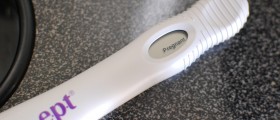
Women ovulate, or release an egg, once every menstrual cycle. Having sex in the few days before ovulation and during it (ovulation lasts around 24 hours) is your best bet for getting pregnant fast. Women can find out when they are ovulating by using an ovulation calendar which tells them the approximate date of their ovulation, and ovulation tests that rely on hormones. Ovulation tests are extremely effective at telling you exactly when you are fertile. A man's sperm count is highest during the morning hours, so having intercourse as soon as you get up increases your chances of getting pregnant. Experts recommend having intercourse twice to three times a week, as too little sex negatively impacts the quality of sperm and too much of it reduces sperm count.
In addition to this, both men and women who are trying to conceive a baby should make an effort to eat healthily, and consume foods from all major foods groups. If you are deficient in vitamins and minerals, your chances of conceiving can be reduced and it may also have a negative impact on your baby if you do get pregnant. Multivitamin supplements can help with this. Exercising regularly and being physically healthy and fit is also good for your fertility.

















Your thoughts on this
Loading...